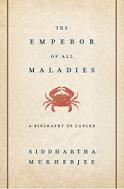 How old is cancer? What are the roots of our battle against this disease? Where are we in the war against cancer? In this comprehensive book’s almost 600 pages, Siddhartha Mukherjee does a magnificent job in answering these questions. The Emperor of All Maladies: A Biography of Cancer, a Pulitzer Prize winner, is a powerful, engrossing read, beautifully expressed and understandable to a lay person.
How old is cancer? What are the roots of our battle against this disease? Where are we in the war against cancer? In this comprehensive book’s almost 600 pages, Siddhartha Mukherjee does a magnificent job in answering these questions. The Emperor of All Maladies: A Biography of Cancer, a Pulitzer Prize winner, is a powerful, engrossing read, beautifully expressed and understandable to a lay person.
As this scholarly book takes readers through the ages, the author sites specific cases, some through his own oncology practice, that give the book a human touch and facts that a lay person can relate to.
Cancer is possibly one of the oldest human diseases. Although we’ve come a long way in learning what it is and what can be done toward curing, or at least controlling it, cancer, in many respects, is still a mysterious disease.
We tend to lump the different forms of cancer altogether. In many respects there is a commonality among the many different kinds, but oncology, the branch of medicine concerned with the study and treatment of cancer, has learned that cancer is not a disease, but a whole family of diseases. These diseases are linked at a biological, cellular level. The particular types of cells, though different within the various types of cancer, abnormally divide and multiply, and eventually “take over” critical organs of the body.
Each type of cancer cell has its own look, its own personality, its own method or pathway it takes through the body. Interestingly, when cells break away from their origin, for instance, with breast cancer, those rapidly multiplying cells might attach themselves to another part of the body, a process called metastasis. Even though it may be in another part of the body, it is identified as metastasized breast cancer.
The study of cancer and its treatment involves a multitude of disciplines, from the many oncology sciences, to cancer screening, to specialists in surgery, radiation, chemotherapy, monoclonal antibody therapy, and even palliative care. In some cases oncologists have isolated probable causes of cancer, such as smoking and working with asbestos. Screening for early detection, such as pap smears and mammograms, have allowed treatment before cancer spreads to other parts of the body. In some cases prevention, such as a vaccination against human papillomavirus (HPV) have avoided incidences of cancer. However, the war on many types of cancer is still raging. New medicines are on the horizon, but testing and availability take funding and time, commodities that many cancer patients don’t always have. Sometimes the best an oncologist can do is redefine victory by focusing on prolonging life rather than eliminating death, making expectations manageable.
Thankfully, gone are the days where a single treatment is tried, then, failing that, another. Nowadays, a cancer patient can consult a team of specialists who work together to provide the best care known to date.
The Emperor of All Maladies:A Biography of Cancer, published in 2010, is an important work, full of compassion, energy and impeccable prose. At the end of the book (at least in the copy I read) an interview with Siddhartha Mukherjee sheds even more light on his passion for cancer enlightenment.


You’ve introduced me to what sounds like an important and fascinating book. Thank you.